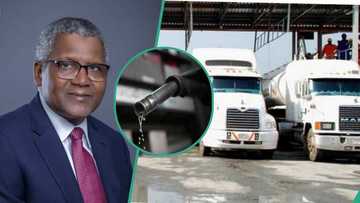Controversy as NNPC Raises Salaries of over 6,000 Staff to Retain Top Talents
- The state-owned oil company, the Nigerian National Petroleum Company Limited (NNPC), has hiked the salaries of about 6,280 staff members
- The company said the salary review aligned with global standards and aimed at retaining top talent
- However, the salary review has come under scrutiny, sparking controversy following the 50% raise by the oil firm
Legit.ng’s Pascal Oparada has reported on tech, energy, stocks, investment and the economy for over a decade.
The Nigerian National Petroleum Company Limited (NNPCL) has stirred controversy after raising the salaries and allowances of more than 6,280 employees.
Investigations revealed some adjustments reached up to 50%, prompting criticism over the timing and scale of the increases.

Source: Facebook
Company defends pay structure
While critics argue the decision places additional strain on national finances, the state-owned oil giant insists the move is necessary to remain competitive in the global energy industry.
According to the NNPCL, its compensation system is financed through a 30% management fee sanctioned by the Petroleum Industry Act (PIA).
As of August 2025, this pool stood at N25.3 billion, based on figures presented to the Federation Account Allocation Committee (FAAC).
A company source maintained that the revised salaries remain modest compared to international oil and gas benchmarks.
“Even with recent adjustments, our compensation remains mid-range by global standards. We continue to struggle with attracting and retaining top talent,” the source said.
Inflation and staff retention pressures
Insiders disclosed that the salary review was backdated in some cases. Critics allege it was a quiet attempt to pacify staff after mounting attrition.
Group Chief Executive Officer Bayo Ojulari was said to have endorsed the increments as part of a wider strategy to keep top talent from leaving.
Reports suggest that several employees who previously left for better-paying federal agencies have since returned to the NNPCL following the review.
The company insists that inflation, currency devaluations, and economic volatility forced management’s hand. Without the increases, it warned, the company risked losing vital technical staff to private competitors.
Workforce profile
As of April 2025, NNPCL employed 6,280 workers, 5,077 men (80.8%) and 1,203 women (19.2%).
The company argues that maintaining staff morale and competitiveness is crucial for operational stability in Nigeria’s fragile energy sector.
Industry observers, however, note that the raises come at a sensitive time when many government agencies face budgetary shortfalls and widespread calls for austerity.
Critics question whether NNPCL should lead with such pay hikes while ordinary Nigerians grapple with inflation and fuel price hikes.
Balancing criticism with necessity
While the raises have sparked outrage, NNPCL maintains that the policy is essential to prevent brain drain in a sector where technical expertise is scarce. It stressed that its salaries are not extravagant but designed to align with industry norms.

Source: Twitter
Analysts argue the debate underscores the challenge of balancing public accountability with the operational realities of competing in a global energy market.
The controversy, they warn, is unlikely to fade soon as Nigerians continue to scrutinise how the country’s flagship oil company manages its resources.
Ardova, MRS filling stations slash petrol prices
Legit.ng earlier reported that to attract more customers in the face of strong competition, Ardova Plc and MRS Oil slashed the pump price of Premium Motor Spirit (PMS), commonly known as petrol.
Checks at some of its filling stations in Lagos showed that petrol prices have been slashed to N865 and N870 per litre.
The latest price range offered by Ardova is N20 lower than the previous N885 petrol price, which is the current price offered by the Nigerian National Petroleum Company Limited (NNPC).
Proofreading by Kola Muhammed, copy editor at Legit.ng.
Source: Legit.ng





